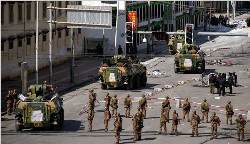Tibetet Segítő Társaság Sambhala Tibet Központ
Tibet Support Association Sambhala Tibet Center
székhely / telephely H-Budapest I. Attila út 123..
(00-36) 70 431 9343 (00-36)70 944 0260 (06-1)782 7721
sambhala@tibet.hu www.tibet.hu tibetpress.info
Facebook/Sambhala Tibet Központ Facebook/Tibett Segítő Társaság
MagnetBank/ 16200010-00110240
IBAN/HU94 16200010 00110240 00000000 SWIFT/HBWEHUHB
(1%) adószám/ 18061347-1-41
nyitva tartás/hétköznap 12.00-20.00 hétvégén előadás függő
» tibeti művészet» lapszemle.hu» thetibetpost.com» eastinfo.hu» rangzen.net» ChoegyalTenzin» tibet.net» phayul.com» DalaiLama.com» vilaghelyzete.blogspot.com» Videók» Linkek» TibetiHírek» Szerkesztőség
Lhasa under intense surveillance, Tibetan pilgrims and businessmen restricted ahead of uprising anniversary/ENG
2019. március 6./Phayul.com/TibetPress
eredeti cikk
By Tenzin Dharpo DHARAMSHALA, Mar. 6: Days ahead of the anniversary of the Tibetan uprising day in Lhasa, the capital city of occupied Tibet is under intense surveillance with Tibetan pilgrims and businessmen from other parts of Tibet being questioned and put through strict vetting processes.
DHARAMSHALA, Mar. 6: Days ahead of the anniversary of the Tibetan uprising day in Lhasa, the capital city of occupied Tibet is under intense surveillance with Tibetan pilgrims and businessmen from other parts of Tibet being questioned and put through strict vetting processes.
According to Radio Free Asia, Chinese authorities are closely questioning Tibetan pilgrims visiting the city and watching the movements of Tibetan businessmen, ahead of the 60th anniversary of the Tibetan uprising day.
A source told the RFA, “With the approach of March 10 and 14, China has intensified its surveillance of Tibetan pilgrims coming to Lhasa from the areas of Kham and Amdo. These pilgrims are being thoroughly interrogated about the reasons for their visits during this month.”
Tibetans who are not residents of Lhasa, especially pilgrims and businessmen, are asked about the length of their stay in Lhasa and required to furnish names and addresses of their hosts in the city. “They are also being asked to keep their mobile phones switched on at all times, and are being reminded to strictly abide by the law and not to become involved in any activities considered to be harmful to (China’s) national security,” the same source said.
Sensitive areas such as the Bharkor city center and the Potala Palace are manned by additional personnel including the police and plain clothed security personnel.
China has also banned access to Tibet for foreign tourists until April in readiness to avoid similar protests in occupied Tibet. The practice to ban foreign tourists in March by Chinese authorities has been an annual occurrence since the 2008 Pan-Tibet protests which saw Tibetans from all regions of the plateau rise against Beijing’s rule. The 2008 protest is considered the largest and most participated, second only to the 1959 protests.
While there is no official directive on the ban, travel agencies operating in the so-called Tibetan Autonomous Region (TAR) have been urging clients to register for trips after April 1 citing permit issues from the government.
Tibetan uprising day on March 10 is commemorated by Tibetan exiles as a day to especially rise against China’s colonial rule in Tibet. On March 10, 1959, the capital of Lhasa erupted in protest as people came out in numbers to protect their leader His Holiness the Dalai Lama against Chinese troops at the Norbulingka palace. The ensuing offensive by PLA resulted in the deaths of 87,000 Tibetans, according to the exile Tibetan government records.
The young Dalai Lama who fled Tibet into India in 1959 is labelled a “separatist” by Beijing despite his willingness to stay with Beijing and seek “meaningful autonomy” for his people. The exile Tibetan government based here has adopted the same as the official stand of the Tibetan people through consensus in the Tibetan parliament in 1991.
